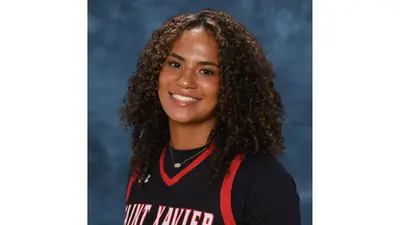Rukisha Crawford, DeKalb County Board Member | DeKalb County
Rukisha Crawford, DeKalb County Board Member | DeKalb County
DeKalb County Board of Health met March 26.
Here are the minutes provided by the board:
BOARD OF HEALTH MEMBERS PRESENT
Derryl Block, RN, PhD
Kellen Bosma, DMD
Lorraine Daly, Secretary
Karen Federici
Kimberly Heinisch
Mark Mattson, Vice President
Jill Olson
Anita Zurbrugg, President
BOARD OF HEALTH MEMBERS ABSENT
Rukisha Crawford
Carlos Dominguez, DVM
Michael Thornton, MD
STAFF MEMBERS PRESENT
Lisa Gonzalez, MPH, Public Health Administrator
Stacia Runge, MSW, Director of Community Health and Prevention
Greg Maurice, LEHP, Director of Health Protection
Erin Frye, MPH, Administrative Support and Marketing Manager
CALL TO ORDER
The DeKalb County Board of Health meeting of March 26th, 2024 was called to order at 6:01pm by Ms. Zurbrugg, President.
AGENDA
On a motion by Dr. Federici, seconded by Ms. Daly, the Board of Health Meeting Agenda of March 26, 2024 was approved. Motion carried.
APPROVAL OF MINUTES
Full Board
On a motion by Dr. Bosma seconded by Dr. Block, the Board of Health Executive Session Meeting Minutes for September 26, 2023 were approved. Motion carried.
On a motion by Ms. Olson seconded by Ms. Daly, the Board of Health Meeting Minutes for January 23, 2024 were approved. Motion carried.
COMMITTEE REPORTS
PERSONS TO BE HEARD FROM THE FLOOR
None.
PRESENTATION
1. Well & Septic Programs
Mr. Maurice presented on the Health Departments’ Well and Septic Programs. He shared the well and septic services provided include septic permits, final septic installation inspections, water well permits, abandonment well permits, final inspection of new wells, inspection of sealed wells, non community well program, water vending machine inspections and well and/or septic property sales inspections.
Mr. Maurice shared services provided by environmental health inspectors are required by State Law and Local Ordinances, which require 85% fieldwork and 15% office setting work. He explained these services protect the health and safety of the general public and provide technical oversight and resources to well and septic contractors. He shared environmental health inspectors have a minimum Bachelor of Science degree and ongoing technical training
Mr. Maurice shared septic permit applications are initially reviewed for completion, then either returned to the applicant for revision or a permit is issued. He stated once the septic system is installed it is inspected. He shared approximately thirty septic inspections occur annually.
Mr. Maurice stated initial septic reviews are done because if a septic system is not working properly or is too close to the drinking water source or a creek or waterway, the wastewater may contaminate the drinking water supply or the creek. He shared an initial review includes assessment of the physical characteristics of a parcel including the location of the well, evaluating the soils and the number of bedrooms and determination of the number of users (residential versus commercial use). He shared differences between conventional and alternative septic systems.
Mr. Maurice explained final septic reviews are conducted on-site with a checklist inspection form to ensure the contractors installed septic system aligns with initial paperwork and drawings. He shared if the installed septic systems differ from initial paperwork, the contractors must submit “as-built” documentation to the health department.
Anita Zurbrugg asked if a septic system needs to be a certain distance from a well. Greg replied yes, there are minimum distances from septic systems to wells, buildings and neighboring property lines.
Mr. Maurice shared for well construction or well sealing permits, submitted paperwork is reviewed for completion, the paperwork is rejected and revisions requested or a permit is issued, and the well/well sealing is inspected during construction. He explained the different types of wells encountered are drilled, driven, or dugged and the typical well lifespan is 25+ years.
Anita Zurbrugg asked how deep the wells typically go into the ground. Mr. Maurice said well depth varies, but typically ranges from 120 feet to approximately 800 feet in depth, with an average between 200 and 300 feet.
Dr. Block asked if there was a requirement by the State to have wells inspected, similar to septic systems. Mr. Maurice shared an initial inspection is required but no periodic or annual inspections are mandated in Illinois.
Lorraine Daly asked how a person knows if their water is safe. Mr. Maurice explained that for a person in city limits, the water department conducts daily testing to meet Environmental Protection Agency (EPA) requirements, but for those using a private well, after the initial inspection is done, additional testing is conducted at their discretion.
Mr. Maurice shared images of rotary drill and cable tool used to create wells and the various components of well heads and caps.
Mr. Maurice explained possible private well contaminants depend on the location and depth of the well. He stated common contaminants include total coliform bacteria and nitrates and uncommon contaminates include metals, pesticides, volatile organic compounds (VOCs) and per-and polyfluoroalkyl substances (PFAS).
Mr. Maurice shared PFAS have been used since the 1940s for water and stain resistance and have human health concerns including a long human half-life, potential to cause cancer, decreased birth rates and immune system effects. He stated sources of PFAS include, but are not limited to chemicals, firefighting foam, paper, textiles, metals, biosolids and septic tanks. Mr. Maurice shared the static map of the State’s PFAS testing of municipal wells.
Mr. Maurice shared general test recommendations for wells, include annual testing for Coliform bacteria and testing for nitrates/nitriles every three years. He stated for agricultural areas, if Coliform bacteria are detected, it is recommended to test for pesticides, and if biosolids have been applied to nearby fields, it is recommended to test for PFAS. He stated that in urban areas, its recommended to consider testing for PFAS and VOCs.
Mr. Maurice shared the program assists contractors and private homeowners with finding labs to conduct testing, determining analytes, reviewing test results and giving treatment recommendations.
Mr. Marice explained other well and septic program activities include investigation of failing septic systems, inspection of well and/or septic systems for property transfers and issuing approval letters for construction. He shared the program issues approximately 30 well permits and oversees approximately 10 well sealings annually.
Mr. Maurice stated the program also conducts non-community well inspections, where a private well serves a business or school, etc. He shared the health department inspects these wells and conducts water testing biannually. He stated water vending machine inspections are also conducted under this category.
Dr. Block asked if the health department has education for the community regarding well and septic inspections and water testing. Mr. Maurice replied promotion of services occurs primarily on social media but there is not a comprehensive education program for County residents.
COMBINED REPORT
Mrs. Gonzalez shared the staffing trends for January and February 2024. She explained during this reporting period there were 46 employees and a Northern Illinois Public Health student began employment as a temporary part-time receptionist.
Mrs. Gonzalez reviewed strategic plan activities completed during the reporting period including development of an online training system for employees, use of existing partnerships to recruit for open positions and exploring opportunities for improving succession planning.
Mrs. Gonzalez shared Illinois Local Project for Assessment of Needs (IPLAN) updates. She stated during this reporting period two additional meetings were held with representatives from the Northwestern Medicine (NM) Community Health Needs Assessment (CHNA) Planning Team. She explained focus of the meetings was to conduct a brief review of the initial data collected by Metopio, a data-science tool platform, determine agenda items and prepare for the Community Engagement Council (CEC) meetings scheduled to take place in March and April 2024.
Mrs. Gonzalez reviewed the timeline for completion of the IPLAN. She shared October 2023 through January 2024 the CHNA survey was conducted, in February focus groups were conducted, in and in March key informant interviews and two Community Engagement Council (CEC) meetings to review and discuss data were conducted. She shared in April the CEC will meet to undergo the prioritization process and in May the Board of Health will review and provide feedback on the CHNA portion of the IPLAN. She stated in June the CEC will review and provide feedback on the Community Health Improvement Plan (CHIP) portion of the IPLAN and the Board of Health will review, provide feedback on, and approve the DeKalb County IPLAN. She explained in July the DeKalb County 2023-2027 IPLAN will be submitted to the State.
Mrs. Gonzalez offered to answer or clarify any questions regarding the combined report included in the Board of Health packets. No questions were posed.
FINANCIAL DATA
On a motion by Dr. Federici, seconded by Dr. Bosma, the Financial Statements for the months of January and February 2024 were approved. Motion carried.
On a motion by Dr. Block, seconded by Ms. Heinisch, the Check Dispersements for the months of February and March 2024 were approved. Motion carried.
OLD BUSINESS
1. Revised 2024 Board of Health Meeting Calendar
Mrs. Gonzalez shared the updated Board of Health meeting calendar for the remainder of calendar year 2024. She noted the July Board of Health meeting was moved to June 25th, 2024.
NEW BUSINESS
1. Draft 2023 DCHD Annual Report – for Board Discussion and Feedback
Mrs. Gonzalez explained the Board of Health Bylaws states the Health Department must publish an annual report explaining the Health Departments activities and expenditures for the past year by June 30th of each year. She shared the bylaws also require the Board of Health to review draft content for Board discussion and feedback. She shared the final report is approved and published publicly thereafter. Mrs. Gonzalez reviewed the draft 2023 DeKalb County Health Department Annual Report.
2. 2023 Solid Waste Annual Report
Mr. Maurice presented the DeKalb County Health Department 2023 Solid Waste Annual Report. He shared over the past three years the total waste deposited (in tons) in the DeKalb County landfill has decreased whereas the total out of county waste deposited (in tons) has increased. He shared the landfill has 37 years of life remaining at the current disposal rate.
Mr. Maurice described the solid waste program achievements in 2023 including the use of social media to raise awareness for the availability of rural recycling sites to divert resident waste from going to the landfill and that an additional recycling site was added for convenience of DeKalb residents. He shared for commercial and multi-unit housing recycling efforts; staff worked with the DeKalb Citizens Environmental Commission on the ongoing DeKalb Sustainability Plan.
Mr. Maurice shared other achievements included hosting the household hazardous waste drive, two electronics collections, holiday lights collection and a township tire collection. He stated relationships were maintained with the waste industry partners, including the Illinois County Solid Waste Managers Association and Citizens Environmental Commission. He explained staff attended webinars for IL PSC, IL Recycling Association, IRF/IRA, IL Food Scraps and Composting Coalition for networking, sharing ideas and staying informed of legislation and advocacy efforts.
Mr. Maurice explained another achievement for 2023 included the launch of a pilot drop off location for free sharps disposal for individual County residents.
Mr. Maurice shared 2024 Solid Waste and Recycling Program goals include increasing community awareness of the availability of rural recycling sites in order to encourage rural residents to utilize them and updating rural recycling drop off signage to allow for increased roadside visibility. He stated the program also intends on working with Municipal leaders to advocate for stronger recycling ordinances for commercial and multi-unit housing owners.
Mr. Maurice stated the program will continue to host the Household Hazardous Waste drive, Electronics Collection, and Holiday Lights collection and continue to increase public awareness about recycling and food scrap collection through public outreach events. He stated other goals include working with municipal leaders to increase overall waste diversion from the landfill and reintroducing the recycling programs within the Sycamore school district and rejoin membership for the Sycamore Sustainability Committee.
Mr. Maurice explained the per capita landfill rate, or the pounds of waste generated per person per day, has decreased from 4.4 lbs in 2014 to 2.97 lbs in 2023.
EXECUTIVE SESSION
1. Collective Bargaining
2. Bi-annual Review of Executive Session Minutes
The Board of Health entered into Executive Session at 7:04pm for the purpose of discussing Biannual Review of Executive Session Minutes and Collective Bargaining Updates under Subsection Number 21 of Section 2 (c) of the Open Meetings Act.
On a motion by Mr. Mattson, seconded by Ms. Daly, the move into Executive Session for the purpose of discussing Biannual Review of Executive Session Minutes and Collective Bargaining Updates, under Subsection number 21 of Section 2 (c) of the Open Meeting Act was approved. Motion carried.
Anita Zurbrugg stated the Board of Health entered Open Session at 7:16pm.
On a motion by Ms. Daly, seconded by Ms. Heinisch, the HIV Case Manager Job Classification and the proposed salary range for a Master of Social Work candidate were approved. Motion carried.
On a motion by Dr. Bosma, seconded by Mr. Mattson, the release of Executive Session Minutes of the meeting held September 26,2023 was approved. Motion carried.
On a motion by Mr. Mattson, seconded by Dr. Federici, Resolution 03262024 to destroy verbatim recordings of the Executive Session meetings held on May 24,2022, June 23, 2022, July 12, 2022, July 14, 2022 and July 26, 2022 were approved. Motion carried.
CORRESPONDENCE AND NEWS
ADJOURNMENT
On a motion by Dr. Federici, seconded by Ms. Daly, the Board of Health adjourned at 7:20pm. Motion carried.
https://health.dekalbcounty.org/wp-content/uploads/2024/03/2-March-26-2024-DRAFT.pdf






 Alerts Sign-up
Alerts Sign-up